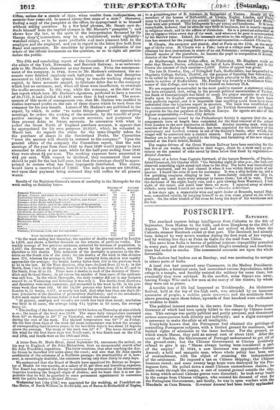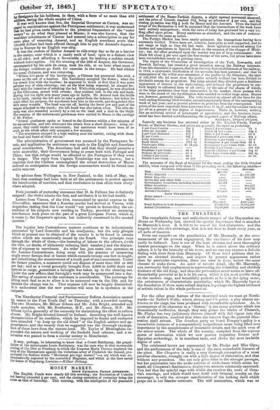POSTSCRIPT.
SATURDAY.
The overland express brings intelligence from Calcutta to the 8th of September, from Madras to the 15th, and from Hongkong to the 29th of August. The regular Bombay mail had not arrived at Aden when the Calcutta steamer Bentinck called at that port. The Bentinck had already been delayed by very severe weather during the first week of her voyage, and by waiting five days at Point de Galle for the mail from China. The news from India is barren of political interest: tranquillity prevailed in every part, and the rumours of Gholab Singh's treachery and machina- tions had ended in smoke. The commercial accounts are upon the whole favourable.
The cholera had broken out at Bcimbay, and was continuing its ravages in others parts of India.
A local riot had occurred near Cannanore, in the Madras Presidency. The Moplahs, a fanatical caste, had committed various depredations, taken refuge in a temple, and forcibly resisted the military for some time; but eventually they were subdued. In the conflict, some Sepoys ran away, leaving Ensign Wise and a few men at the mercy of the rioters; by whom- they were cut to pieces.
A terrible loss of life had happened at Trichinopoly. An idolatrous festival, held at the top of the high rock, was attended by an immense concourse of people.' a sudden panic occurred; and the multitude from above pressing upon those below, upwards of four hundred were suffocated or trodden to death.
The political interest centres in the news from Macao; the Portuguese Governor of which had been openly killed in the campo by Chinese assas- sins. This outrage was partly political and partly personal, and threatened serious consequences both directly and indirectly; and, a slight retrospect is necessary to make the affair at all intelligible. Everybody knows that the Portuguese had obtained the privilege of controlling Portuguese subjects, with a limited ground for residence, and limited rights of admission to the inner harbour. For the ground, on which stands Macao, they paid an annual rent of about 1251. After the treaty of Nankin, the Government of Portugal endeavoured to get rid of the ground-rent; but the Chinese Government at Canton positively refused to give it up; "Macao always having been considered a part of the empire." In 1844, a new Governor was appointed—Senhor Amaral; a bold and energetic man, whose whole policy has been one of encroachment, with the object of attaining the independence of the settlement. He imposed a tax on Chinese shipping; the Chinese boatmen rioted; and some twenty large boats were destroyed by the Por- tuguese forts. He pulled down a small Chinese customhouse station; he made roads through the campo, a sort of neutral ground outside the city, in doing which several Chinese graves were disturbed; he took away lands in the campo from Chinese villagers, who resisted his demand of rent for the Portuguese Government; and finally, he was in open warfare with the Mandarin at Ca= Branca. Gesernor Amaral had been loudly applauded by foreigners for his boldness, in thus, with a force of no more than 450 soldiers, daring the whole empire of China. It was well known that Seu, the Imperial Governor at Canton, was en- gaged in machinations against the Portuguese settlement; it was understood that he had given carte blanche to the piratical frequenters of the "outer waters" to do what they pleased at Macao; it was also known, that the wealthier inhabitants of Canton had entered into a subscription to pay for some plan of removing Amaral, and an English merchant avers that 150,000 dollars had been offered through him to pay for Amaral's deporta- tion to Europe by an English war-ship. It was the custom of Senhor Amaral to ride every day as far as a barrier in the camp*, near which is a sandy neck of land, open to a distant view on all sides, and affording a favourable spot for making a sudden attack without interruption. On the evening of the 22d of August, the Governor, accompanied by his aide. de-camp, took his ride, at an hour when most of the foreign residents go forth for exercise in the campo. He had ridden his usual distance, and was returning.
"Within 150 paces of the barrier-gate, a Chinese boy presented him with a flower on the end of a bamboo. His Excellency accepted the flower; when the boy struck him with the bamboo: he appeared to think at first that it was some peculiar way of chin-chinning; but on the blow being repeated, he stooped for- ward with the intention of rebuking the lad. While thus engaged, he was attacked by five Chinemen, armed with swords; they stabbed him in the side and back. Raving lost his right arm many years ago in battle, Mr. Amaral took the bridle in his teeth, raising the left arm to take a pistol from the holsters; but before he could effect his purpose, the murderers bore him to the earth, and despatched him with many wounds. The head was cut off, leaving the lower jaw and part of the tongue attached to the trunk; the left hand was also taken away. The aide-de- ramp was also wounded severely by a cut on the heed and a stab in the thigh. The remains of the unfortunate gentleman were carried to Macao in the carriage of Mr. Forbes.
"Several gentlemen spoke or bowed to the Governor within a few minutes of his assassination, and two witnessed the attack from a short distance: being un- armed, they could render no assistance; but assistance would have been of no avail, as the whole affair only occupied a few minutes.
The murderers escaped in a boat waiting near the barrier, taking with them the head and hand of their victim."
The administration of government was assumed by the Portuguese Se- nate, - nate and application for assistance was made to the English and American naval commanders. The Americans had said that they should preserve a strict neutrality, their Government beioe at peace both with Portugal and China; but that refuge would be afforded to the Portuguese if they were in danger. The reply from Captain Troubridge was not known; but a suspicion that the Chinese contemplated the actual destruction of Macao induced an anticipation that the foreign commanders would be forced into active succour.



























 Previous page
Previous page